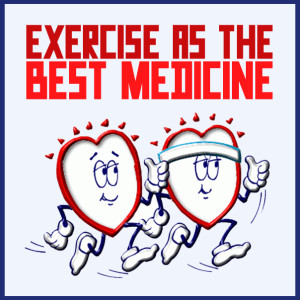In addition to its beneficial effects in patients with mood disorders, exercise has been found to be an excellent anxiety reliever. 30 million Americans suffer from severe anxiety that impairs daily functioning. This article will discuss anxiety disorders and research regarding the role of exercise in their treatment.
What are the anxiety disorders?
One in four people experience anxiety, and women are diagnosed twice as often as men. The DSM-IV lists several anxiety disorders, including generalized anxiety disorder (GAD), panic attack, social and specific phobias, and obsessive compulsive disorder. GAD is diagnosed by at least six months of anxiety with changes in energy, concentration, sleep or psychomotor function. There is often a genetic component, and 25 percent of patients have a first degree relative with anxiety disorders. GAD is most likely due to abnormalities in the adrenergic and serotonergic pathways, and is hypothesized to involve the frontal lobe, limbic system and basal ganglia.
How can exercise relieve anxiety?
Exercise reduces anxiety much in the same way it reduces depression. The same mechanism of endorphin release can have anxiolytic as well as anti-depressive effects. Furthermore, exercise improves alertness, concentration and quality of sleep, all of which are often negatively affected in anxiety.
What does the research show?
Research has shown that exercise can help reduce anxiety, and is more effective than placebo in reducing anxiety in patients with panic disorder. In a study of 19,288 adolescent and adult twins and their families, those who exercised were found to be significantly less anxious.
So can exercise be used as therapy for anxiety disorders?
Exercise not only reduces anxiety in patients with GAD, but has proven an effective adjunctive therapy for other anxiety disorders as well. In their 1998 study, Broocks et al. compared exercise, placebo and clomipramine — the gold standard therapy — in the treatment of panic disorder. They found that exercise is more effective than placebo in reducing anxiety, but less effective than clomipramine. These results suggest that exercise is a beneficial adjunctive therapy to the traditionally prescribed pharmacotherapy for a wide range of anxiety disorders.
What type of exercise is most effective?
A meta-analysis of 15 years of exercise and anxiety research found that aerobic exercise is the most effective exercise type for reducing anxiety, and at least 21 minutes of exercise was needed to achieve an effect.
Who can benefit from exercise?
Whether experiencing anxiety due to the stresses of medical school or suffering from a debilitating anxiety disorder, exercise can help. As the research shows, a moderate amount of aerobic exercise can alleviate various types and degrees of anxiety. And since patients with anxiety often suffer from comorbid depression, exercise may provide a dual benefit in elevating mood and assuaging nerves.
Why is this research relevant to medical students?
It is dually important for medical students to be aware of the benefits of exercise in anxiety relief, since they can both use exercise as personal therapy as well as prescribe it to their patients. A 2006 review of 40 studies regarding depression, anxiety, stress and burnout in U.S. and Canadian medical students found that they have significantly higher levels of such psychological distress than their age-matched peers. A study of 537 Chinese medical students found that little exercise was associated with higher levels of anxiety in students.
Based on these studies, medical students can help to prevent or reduce anxiety by engaging in exercise. And those who reap the benefits of exercise are more likely to conscientiously prescribe this remedy to their patients on a regular basis.




